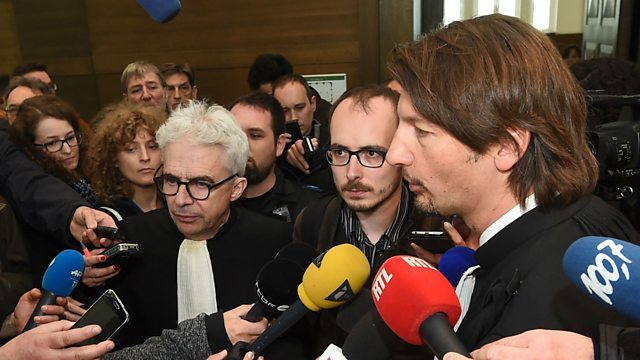Luxembourg Tax Whistleblowers Convicted
A court in Luxembourg has convicted Antoine Deltour and Raphael Halet of stealing private documents from their accountancy firm and passing them to a journalist.
Should employees have to keep their employers' secrets - even when those secrets open up shady tax avoidance deals between between international companies and the government? A court case in Luxembourg has ended with two former employees of the accounting giant Price WaterHouse Coopers convicted and given suspended prison terms.
Antoine Deltour and Raphael Halet had been involved in leaking 45,000 documents about sweetheart tax deals involving PepsiCo, AIG and Deutsche Bank. The information was published as LuxLeaks by the International Consortium of Investigative Journalists in 2014. The case has provoked demonstrations by those supporting the rights of whistleblowers, and embarrassed the Luxembourg government. We hear from Romain Deltour - the brother of convicted whistleblower Antoine Deltour.
Shellshocked European leaders have been meeting in Brussels to discuss Britain's vote to leave the European Union. It was the first meeting of the European Council without the British Prime Minister David Cameron. Financial services are a mainstay of the British economy - with 2.2 million people employed across the country - in banking, insurance, commodity trading and so on. The centre of the action is of course London - one of the world's financial centres. So what implications will Britain's withdrawal from the EU have for the British economy? That is a question the Βι¶ΉΤΌΕΔ's Anna Holigan put to Jeroen Dijsselbloem chair of eurozone finance ministers.
Gerard Lyons is a former economic advisor to Boris Johnson - now a favourite to take over from David Cameron as Britain's prime minister. He wanted Britain to leave the European Union. The Βι¶ΉΤΌΕΔ's John Bithrey asked him whether the loss of passporting rights would be damaging.
European leaders have been discussing the fallout of a Brexit in Brussels, the Belgian capital and the heart of the EU operation. Tens of thousands are employed in the city as part of what many British call the 'Brussels bureaucracy' - either employed directly or by firms lobbying on behalf of businesses, charities and other organisations across Europe. Several days after the British vote to leave the EU, how is the news sinking in, in this most European of capitals? We hear a selection of views.
The effects of Britain's decision to leave the European Union are being felt all over the world. The Βι¶ΉΤΌΕΔ's Mariko Oi reports now from Japan - where a soaring currency and doubts over the future of the whole of the European Union are concentrating business minds.
Why do people make terrible decisions? There may be a few people here in Britain asking that after the referendum on EU membership - there will of course be many who see it as a good decision. In the world of business and politics there are very often bad moves made by highly intelligent and experienced executives. Why? Andre Spicer is professor at the Cass Business School in London and together with a colleague Mats Alvesson he has been writing about this in a book called the Stupidity Paradox.
Where do you live? I mean where exactly? Believe it or not everywhere on the planet can now be identified with three words. It is a project by a company based in Britain called What3Words. It has just been adopted by Mongolia and its national post office. We speak to the company's founder and boss, Chris Sheldrick.
We are joined by two guests on opposite sides of the Pacific - Ralph Silva of the Silva Research Network in Toronto, and Catharine Yeung, investment director at Fidelity Investment, from Hong Kong.
(Photo: Former employee at services firm PwC Antoine Deltour (2nd R) and his lawyers Philippe Penning (R) and William Bourdon (C) address the media at the courthouse in Luxembourg. Credit: John Thys/AFP/Getty Images)
Last on
Broadcast
- Thu 30 Jun 2016 00:06GMTΒι¶ΉΤΌΕΔ World Service except News Internet
Podcast
-
![]()
Business Matters
Global business and finance news and discussion from the Βι¶ΉΤΌΕΔ


